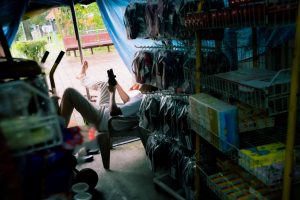Picture these two children.
1) A Primary One student who always scored near full marks. When she scored 85/100 for her math grade during the Continual Assessment 2, she saw her parents trying to hide their disappointment. It was her lowest mark of the year.
2) A student who went from being first in class during Primary One to being last in class during Primary Six. She frequently felt her parents’ frustration when she showed them her report cards: why wasn’t their daughter smarter? She scored 253 for PSLE in the end, but her parents’ disappointment would go on to shape her sense of self-worth for the next two decades.
Both these kids are me.
It took me almost two decades to understand that the education system wasn’t entirely to blame for the pressure I felt. Instead, it was my parents’ fears that I wouldn’t be successful if I didn’t score good grades. There was always a sense that I’d let them down whenever I scored lower than average or picked a path they disagreed with, such as opting out of the Triple Science stream in secondary school.
When Life Beyond Grades first launched, we criticised the campaign for excluding low-SES students, despite its aim to narrow the inequality gap by telling parents to place less emphasis on grades. Yet I don’t deny the campaign is perfect for parents who place high expectations on their child, unaware that their child may just shoulder the burden well into adulthood.
So I sat down with Tjin Lee and Charmaine Seah, two of the five founders of Life Beyond Grades, for a frank discussion on staggering parental expectations, using their privilege, and whether they would send their own child to a neighbourhood school.

TJIN: One main reason was because I realised we’d forgotten how to raise kind children. This is about parental upbringing: how we’re raising our children and how we’re emphasising what’s important along the way.
Did you know that Singapore is top 3 in the world for bullying? When I told my friend that I don’t mind what grades my son gets, she told me, “Oh Tjin, that’s so naive. Your child is going to go into Primary One and have low self-esteem.” And that was because her child came home crying after no one wanted to be her friend after she scored a ‘B’.
When I was invited to be on a panel with Education Minister Ng Chee Meng about a year ago, I had all these questions about the education system ready to fire at him. Then he began, “Parents, we must understand there’s life beyond grades. An ‘A’ is not everything.” And I could only gawp at him like a goldfish because he’d said everything I wanted to say.
After that, I asked, “Minister, why are you saying these things? You are the Minister. Can’t you fix it?” He replied, “I’ve been saying these things for five years, but we can’t move the system if parents don’t move along with us.”
That helped me realise that it takes the public sector, private sector, and people all to shift together.
When we launched the campaign, people said we were saying education is not important, which is untrue. We are very clear that grades are important. Excellence is important.
RICE: I think people got that misconception because it appeared that most of those featured came from creative or non-traditional careers that don’t really require grades in the first place. It seemed like there was very little diversity.
TJIN: It was a calculated decision to pick these people. People saw the influencers because the influencers had the reach. We needed these people to spread their stories, so that others could be aware. We needed people with a voice.
CHARMAINE: We involved high scorers because we wanted it to be a balanced campaign. It also helped us address tiger moms, since they could relate better to high scorers. But we looked for those in alternative careers. We wanted to show that you can score well but it doesn’t mean you have to become a doctor or a lawyer. Even if you do score well, it doesn’t mean that the path to success is easy.
RICE: Why didn’t Life Beyond Grades approach how we talk about failure then? Singaporeans get a bit testy when you bring in grades. They know grades matter when you apply for a job.
TJIN: We needed to come in strong. If we came out with a campaign that talked about grit and resilience at the start, nobody would have paid us attention.

TJIN: My son can name you every humpback whale. He can tell you how long the whale is and knows all the parts; he can tell you what the fuselage is on an airplane. But he can’t spell, he can’t read, he can’t write. While I thought that was normal, other mothers were scaring me. They said other five-year-olds were already reading. It made me question if I was a bad mom.
My real worries stem from my insecurities as a mom. Then I realised I felt the pressure because everyone’s three-year-old was in enrichment classes. I want my son to have the same childhood I did, which is play-based learning.
RICE: So I assume you support the Ministry of Education’s (MOE) recent push towards removing some exams and a student’s class standing on their report card?
TJIN: I’m concerned that the tuition centres will use this opportunity to prey on parents’ fears by doing the testing on behalf of schools. The upper classes are gaming the system. They don’t like change because they have the system figured out now.
The government has shown that it wants to downplay the emphasis on grades. So what would it take for us parents to progress with them?
CHARMAINE: In the comments on ST’s Facebook post, there were even parents saying, “If we don’t know what our child’s class standing is, how do we help them improve? This shows that Minister Ong doesn’t know what the people want.”
RICE: I can understand where these parents come from though. How do you tell your child to focus less on grades, while keeping them competitive?
CHARMAINE: Ironically, these exams have caused our youth to be less resilient. Many students think that as long as they do well, they’re headed for a life of success. When they don’t do well, they can’t deal with not being the best. While we think exams are helping students become more competitive, it’s the opposite.
RICE: In that case, do you think the next step should be to scrap PSLE?
TJIN: We’ve asked MOE that exact question and their answer was sobering. They said, “Tjin, if we do, it becomes a lucky draw. Would you then be content without any merit at all and without knowing what your children are good at?”
Tests and exams are not in themselves harmful. How we view the PSLE is different from what it was intended to do. PSLE has become a placement test. If we weren’t so obsessed where that places our child, we’d pressure them less hard.
The problem lies with parental expectations and how we frame the world for our children.
CHARMAINE: When I was in school, I thought exams were games. They were fun, because my parents never made me feel like I was a failure if I did badly. The PSLE helped me realise very clearly what my strengths and weaknesses are.
When I collected my PSLE results slip, I scored 218. I was devastated. But my mom was fine. Her reaction helped me have a better sense of self-esteem. That is what’s missing these days. Kids develop at different paces, but they don’t have that parental support to tell them it’s okay.
RICE: Not many children are as fortunate. And many of them can tell when they’ve let their parents down, even if their parents might seem fine with which school they go to. Would you send your child to a neighbourhood school then?
CHARMAINE: Yeah I’m considering! I was talking to Sara Wee the musician, who was telling me about a neighbourhood school in Toa Payoh that has a great drama programme. She says the children there are some of the best students she’s taught. Because of that conversation, this is something that I’m considering now. But some of us don’t even bother investigating on our own because we’re closed off to the idea.
TJIN: I’ll honestly send my child down the path of least resistance.
People on social media have said that if we don’t believe in the system, then why aren’t we homeschooling our children? You know how much work it takes? You have to do so much research, as well as have the ability and talent. It’s not just play play, you know.
RICE: That’s a terrible solution. Taking your child out of the system doesn’t make the system go away. The system still exists and your child is going back into it one day. So it’s important to learn how it works.
TJIN: Yes. The job disruption is coming, and it’s going to affect everyone regardless of class. Some people say grades are the only way they can improve their social standing. But we need to relook that thinking; the world is changing and so is the way that employers are hiring. What we thought was a headstart is no longer a headstart.
A lot of parents live vicariously through their kids. That’s not fair. Your children are their own people and have the right to live their own lives.
CHARMAINE: But I suppose if that’s the only life you knew growing up, then you can’t help but want to give that same life to your child. If grades were the leveller back then, and you don’t know any better, you’d think that was the only way out [of one’s social class] now.
TJIN: We’re in conversation with MOE, because we can’t do this on our own. We don’t want to be just parents speaking to ourselves and among ourselves.

TJIN: We need to. Those of us who are enabled and empowered have a voice, so we should use it. If we don’t speak up, who will? If we want to narrow the inequality gap, the onus rests on the high-SES to make the change.
I’ve always wanted to see how we can lift the bottom, and I hope we can teach this to our children. It’s so important to raise kind children who are happy to embrace diversity.
CHARMAINE: I realised policymakers do want to listen and make changes, but their hands are tied to a certain extent. When they try to roll things out, they’re immediately met with fierce criticism. When they try to make changes in schools, or when schools take initiative to make changes, the parents come down hard on them.
TJIN: Parents are not letting teachers do their jobs. The teachers are there to teach, but they can’t teach if the students know more than everyone does. Sometimes they skip material, if most students already know the stuff. The problem is if my kid isn’t getting tuition outside, he will get left behind.
RICE: But this deep-rooted inequality isn’t something education can (and perhaps even should) fix alone.
TJIN: Yes, it’s beyond education. How do we build a more socially inclusive society? How do we build spaces where people from different classes can bond? What if you were able to look at another ministry to create activities or communities to bring kids together to learn coding on weekends, for example? The bigger picture might not be solely MOE’s problem to solve.
We’ve always looked at education as the leveller. For example, if I get my child into ACS, he will have the network. But a school is mainly there to educate, they’re not there to build social capital.
To be honest, I am privileged to have built a strong network through my work, and I recognise that. We should be giving children the ability to build this kind of social capital outside school.
RICE: How do we attempt to level the playing field in other effective ways beyond education though?
TJIN: I think the ability to communicate is the most important thing you can give a child. A strong vocabulary is empowerment. The leveller is language, isn’t it? If we want to empower and give confidence to children, teach them how to speak fluently. Because interaction is the first point of contact. It’s more important than math or science.
That said, if the low-SES don’t have the money to send their children to English tuition, that’s where funds should be allocated.

TJIN: We’re in this for the long haul. We have a series of four talks lined up, which will start in November. They’re about the future of jobs and hiring, mental wellness, and building skills of the future. We also have a financial literacy workshop targeted at parents. And we plan to do a video series featuring 10 alternative careers.
CHARMAINE: We’d like to run the wellness talks in schools. Speaking with someone who works in a social enterprise, we realised many children don’t know where to go or who to turn to when they face exam stress. We want to help them address that, regardless of their family background.
RICE: I think it’s also necessary to show the realistic side of things. For example, that there are people with scores of 270 to 280 who aren’t doing ‘well’ in life.
TJIN: We’d like to redefine success and happiness. Many parents think being successful is being happy. But to me, it’s the other way around: if you’re happy, that’s success. We need to educate the parents if we want to impact their children.
With everyone we featured in our campaign, I asked if they were happy.
They said yes.
I replied, “Then you’re successful.”






